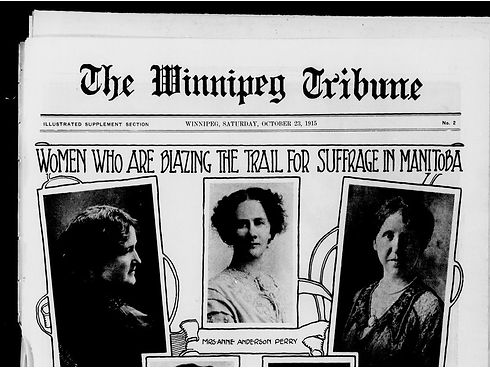LEARN
Educational
Resources
The Nellie McClung Foundation provides educational resources to recognize the women and men who fought for equality.
Our content contributors have extensive experience and expertise. As retired teachers, principals and consultants, they firmly believe that all children/students can learn; they simply need to be taught in a manner that recognizes their various learning styles, and they especially need to be provided with material that they can read themselves. In this sense, we refer to ‘reading’ as comprehension or making meaning.
As a result, in our Learning Plans, we’ve concentrated on helping teachers learn new strategies especially for activating prior knowledge, building vocabulary, and providing them with different ways to help students learn – to go way beyond lecturing or telling students about Nellie McClung and the women’s movement.
LEARN
Educators Curriculum
The Learning Plans have been designed to meet the Manitoba Social Studies curriculum, with gracious input from those who design and write our provincial social studies programs. In Manitoba, Nellie McClung and the history of the Women’s movement is presently studied in Grades 4 & 6 as well as Grades 9 & 11.


ABOUT
Nellie McClung
Canada's Most
Famous Suffragist
Nellie McClung was born Nellie Letitia Mooney in Ontario on October 20, 1873. At seven years old, she moved to Manitoba where she would grow up and begin to sow the seeds of many incredible political contributions later in life. At the age of just sixteen, she began teaching at a school near Manitou, Manitoba and through her connections there, became involved in several emerging social reform groups.

LEARN
Political Equality League
The Political Equality League was a group active in Manitoba between 1912 and 1916 that successfully lobbied for women's suffrage at the provincial level. They were famous for hosting a mock parliament in which Nellie McClung parodied the Conservative premier Rodmond Roblin, with a parliament of women dismissing men's claims for rights using the same arguments used by men to dismiss women's claims.
LEARN
The Famous 5 and the Persons Case
On October 18, 1929, a landmark legal decision for Canadian women was made when women were legally recognized as “persons” under British common law. The decision was made necessary because The British North America Act, which governed Canada at the time, used the word “persons” when it referred to more than one person and the word “he” when it referred to one person.


